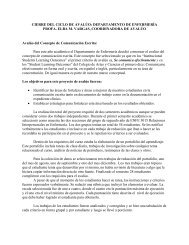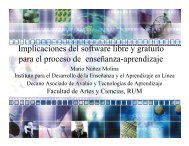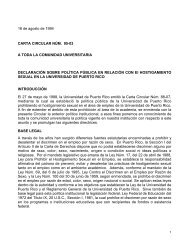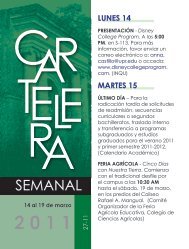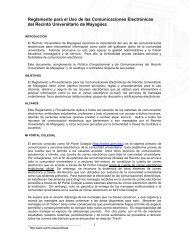Undergraduate Catalogue - UPRM
Undergraduate Catalogue - UPRM
Undergraduate Catalogue - UPRM
Create successful ePaper yourself
Turn your PDF publications into a flip-book with our unique Google optimized e-Paper software.
COLLEGE OF ENGINEERING<br />
Research laboratory facilities available for both<br />
undergraduate senior and graduate level work<br />
include:<br />
• Atmospheric Phenomena Laboratory<br />
Center for Power Electronic Systems<br />
(CPES)<br />
• Computing Research Laboratory<br />
Electric Energy Processing Systems<br />
Laboratory<br />
• Human Computer Interaction Laboratory<br />
Ionospheric Radar Laboratory<br />
• Laboratory for Applied Remote Sensing<br />
and Image Processing (LARSIP)<br />
• Microwave and Antenna’s Laboratory<br />
Optoelectronic Systems Research<br />
Laboratory<br />
• PASCOR Laboratory<br />
• Power Electronics Laboratory<br />
• Radiation Laboratory<br />
• Software Research Laboratory (SoReL)<br />
Space Information Laboratory Process<br />
Control Laboratory<br />
The Electrical and Computer Engineering<br />
Department is the largest academic department at<br />
<strong>UPRM</strong>, and it is currently the 24th Largest in the<br />
USA. The Department currently includes over<br />
1,400 undergraduate, over 120 MS students, and<br />
over 20 Ph.D. students enrolled in its programs<br />
(with over 27% female students – nearly twice<br />
the average of US programs). The Department<br />
accounts for over 12% of the entire<br />
undergraduate student population at <strong>UPRM</strong>.<br />
During the academic year 2001-02 a total of 235<br />
undergraduate degrees in electrical and computer<br />
engineering were awarded.<br />
The Electrical and Computer Engineering<br />
Department has a very dynamic and prolific<br />
faculty. During the academic year 2001-02, the<br />
Department obtained approximately $4.2M in<br />
external funds for research, academic, and<br />
outreach activities – 21% of <strong>UPRM</strong> total<br />
research funds obtained. The ECE faculty<br />
members were also responsible for over 33% of<br />
all undergraduate and graduate research<br />
assistantship funding awarded at <strong>UPRM</strong>, thus<br />
placing them as leaders in research mentoring.<br />
The quality of the Department’s faculty is clearly<br />
illustrated by the following sample of recently<br />
obtained prestigious research awards: one<br />
National Science Foundation (NSF) Presidential<br />
Early Career Award, four NSF Career Awards,<br />
one NASA Faculty Award for Research, two<br />
NSF Major Research Instrumentation Awards,<br />
one NSF Next Generation Software Award, one<br />
NSF Computer Information Science and<br />
Engineering Award, and two NSF Engineering<br />
Research Center Awards.<br />
Bachelor of Science in Electrical<br />
Engineering<br />
Electrical Engineering integrates mathematical<br />
and scientific principles of electricity and<br />
magnetism to analyze electrical phenomena and<br />
to design electrical systems. Electrical systems<br />
are present in almost any situation of our daily<br />
lives, ranging from the generation of electrical<br />
power vital to the social and economic wellbeing<br />
of society, to appliances, instruments, and<br />
devices at home and at work. Electrical and<br />
electronics systems are present in almost all<br />
aspects of daily life. Therefore, our Electrical<br />
Engineering program is designed to prepare<br />
students for a wide-range of careers involving<br />
design and implementation of electrical systems.<br />
The objectives of the Bachelor of Science in<br />
Electrical Engineering Program are to:<br />
1. Obtain a broad educational experience<br />
necessary to understand the impact of<br />
electrical engineering problems and<br />
solutions within a global and societal<br />
context.<br />
2. Possess a combination of knowledge<br />
and analytical, computational, and<br />
experimental skills necessary to solve<br />
practical electrical engineering<br />
problems.<br />
3. Have adequate communications skills<br />
both as an individual and as part of a<br />
team.<br />
4. Value the importance of lifelong<br />
learning.<br />
5. Be aware of contemporary issues and<br />
be able to make decisions taking into<br />
consideration professional and societal<br />
needs, and ethical implications.<br />
The profession of Electrical Engineering has<br />
evolved to encompasses many fields of<br />
specialization. In recognition of that fact, the<br />
undergraduate program is structured into a<br />
common core sequence of courses which<br />
provides a broad coverage of the areas which<br />
Electrical Engineers are expected to master, and<br />
a cluster of technical electives which study<br />
closely at least one area of the discipline.<br />
Current options include:<br />
<strong>Undergraduate</strong> <strong>Catalogue</strong> 2004-2005 291




